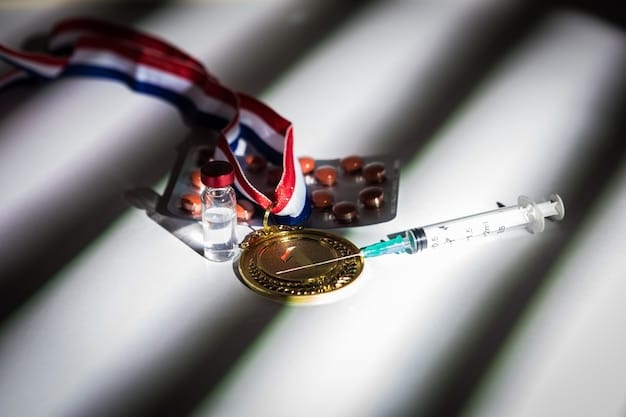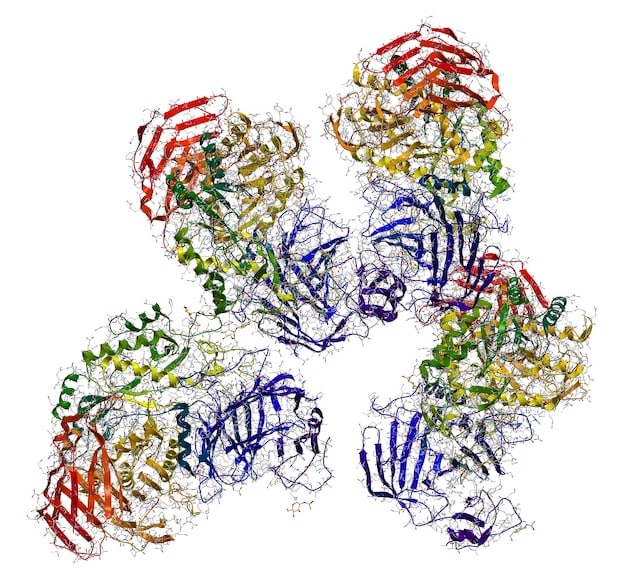Ethical Considerations of Performance-Enhancing Drugs in Professional Sports

The use of performance-enhancing drugs (PEDs) in professional sports raises profound ethical dilemmas, challenging the fundamental principles of fair play, athlete well-being, and the integrity of competition due to perceived unfair advantages and potential health risks.
In the high-stakes world of professional sports, the pursuit of victory often pushes the boundaries of human capability. Yet, this relentless quest for excellence frequently collides with complex moral questions, particularly when it involves performance-enhancing drugs (PEDs). Exploring what are the ethical considerations surrounding the use of performance-enhancing drugs in professional sports delves into a nuanced debate that impacts athletes, organizations, and fans alike, challenging our very definition of fair competition and human achievement.
The Integrity of Competition: A Level Playing Field?
The essence of professional sports lies in fair competition, where success is earned through talent, dedication, and hard work. The introduction of performance-enhancing drugs fundamentally undermines this principle. When some athletes utilize substances to gain an artificial advantage, it creates an uneven playing field, making genuine athletic prowess seem secondary to pharmaceutical assistance.
This erosion of fairness directly impacts the integrity not only of individual events but also of entire sporting disciplines. Spectators and fellow athletes alike begin to question the legitimacy of records broken and victories celebrated, leading to a profound sense of disillusionment. The spirit of healthy competition, which relies on the notion that every participant adheres to the same rules, is compromised when PEDs are involved.
Defining “Fair Play” in a Modern Context
The concept of “fair play” has evolved significantly throughout sports history, yet its core remains steadfast: competition should be just and equitable. For many, PEDs are anathema to this ideal. They argue that fairness dictates that all athletes compete using only their natural abilities, honed through legitimate training methods. To deviate from this, by artificial means, is seen as cheating and an affront to the sport itself.
However, the definition of “natural ability” can itself be complex. Advancements in sports science, nutrition, and training techniques constantly push the boundaries of human performance. The line between what is considered a legitimate enhancement and an illicit one often blurs, leading to ongoing debates and controversies.
- Equal Opportunity: PEDs deny genuinely talented athletes the opportunity to compete on an equal footing, as they are often outmatched by those who choose to dope.
- Sacrifice of Values: The pursuit of victory at any cost, enabled by PEDs, sacrifices the values of integrity, sportsmanship, and respect for the game and its participants.
- Erosion of Trust: Widespread doping scandals diminish public trust in sports, making it harder for fans to believe in the authenticity of athletic achievements.
Ultimately, the ethical consideration here centers on preserving the intrinsic value of sports. This value is not merely in winning, but in the honest pursuit of excellence and the demonstration of human potential within mutually agreed-upon parameters. PEDs challenge these parameters, forcing uncomfortable questions about the future of athletic competition.
Athlete Welfare: Health Risks and Coercion
Beyond the philosophical arguments about fairness, the ethical debate around performance-enhancing drugs confronts the very real and often severe health consequences for athletes. Many PEDs carry significant short-term and long-term side effects, ranging from cardiovascular issues and liver damage to psychological disturbances and addiction. The pursuit of enhanced performance through these substances can, ironically, lead to irreparable harm to the athlete’s body and mind.
Furthermore, the pressure to use PEDs, whether self-imposed or externally coerced, presents a critical ethical challenge. Athletes operate in an intensely competitive environment where marginal gains can mean the difference between triumph and obscurity. This intense pressure can push individuals toward doping, even if they are fully aware of the associated health risks. The narrative often shifts from individual choice to systemic pressure.
The Unseen Pressures on Athletes
Athletes are not always entirely free agents when it comes to doping. The economic realities of professional sports mean that careers are short, and the financial rewards for success are immense. This creates an environment where the temptation to dope can become overwhelming, particularly if an athlete perceives that their competitors are gaining an illicit advantage. The fear of being left behind, or losing a lucrative sponsorship, can be a powerful motivator.
Moreover, cases of direct coercion or subtle encouragement by coaches, trainers, or even medical staff are not uncommon. An athlete might feel obliged to comply to retain their position on a team, secure a scholarship, or simply to stay competitive. In such scenarios, the athlete’s autonomy and well-being are significantly compromised, raising serious questions about the moral responsibilities of those in positions of power within sports organizations.
- Cardiovascular Problems: Steroids can lead to increased risk of heart disease, stroke, and high blood pressure.
- Liver Damage: Oral steroids, in particular, are known to cause liver tumors and hepatitis.
- Psychological Effects: Aggression, mood swings, depression, and addiction are common psychological side effects.
The argument for strict anti-doping regulations is often rooted in a paternalistic concern for athlete welfare, asserting that sports federations have a duty to protect athletes from making choices that could harm them. This becomes even more complex when considering the long-term impact on quality of life post-sporting career. The ethical imperative is to balance the competitive drive with the fundamental human right to health and safety.
The Role of Anti-Doping Agencies: Policing Purity
In response to the pervasive issue of performance-enhancing drugs, anti-doping agencies like the World Anti-Doping Agency (WADA) have been established to police and regulate the use of banned substances. These organizations are tasked with maintaining the integrity of sports through testing, education, and research. However, their methods and the very philosophy behind their existence also raise their own set of ethical considerations.
A primary function of these agencies is to enforce a strict liability principle, meaning athletes are responsible for whatever is in their system, regardless of intent. While this simplifies enforcement, it can lead to situations where athletes are sanctioned for inadvertent exposure or contamination, posing an ethical dilemma regarding individual accountability versus systemic failures. The balance between strict enforcement and protecting innocent athletes is a constant challenge.

The Ethics of Surveillance and Privacy
Anti-doping measures often involve extensive surveillance, including out-of-competition testing that requires athletes to disclose their whereabouts at all times. This level of intrusion into an athlete’s personal life raises significant privacy concerns. While necessary for effective deterrence and detection, it can be seen as an erosion of fundamental rights, creating an atmosphere of mistrust and suspicion.
The collection and storage of biological samples for years, and the potential for new testing methods to retrospectively catch dopers, also bring forth ethical questions about consent and the long-term implications for an athlete’s career and reputation. The tension between the collective good of clean sport and individual privacy rights is a contentious area within anti-doping ethics.
- Whereabouts Requirements: Strict rules demand athletes to provide regular updates on their location, enabling unannounced drug tests.
- Therapeutic Use Exemptions (TUEs): The process for obtaining TUEs, which allow athletes to use banned substances for legitimate medical reasons, is subject to scrutiny to prevent abuse.
- Sanction Severity: The ethical debate extends to the proportionality of sanctions, with calls for rehabilitation over punitive measures in certain cases.
Ultimately, anti-doping agencies face the perpetual challenge of staying ahead of new doping methods while operating within a framework that respects human rights and due process. Their ethical mandate is not just to catch cheats, but to foster a culture of fair play and protect the health of athletes, all while navigating the complex interplay of science, law, and individual liberty.
The Spectator’s Right to “Real” Performance
The consumption of sports by fans forms a significant part of the pro sports ecosystem. Spectators invest their time, emotion, and often money, into watching athletes perform. Implicit in this investment is the belief that they are witnessing genuine human achievement—performances born of natural talent, rigorous training, and fair competition. When the use of performance-enhancing drugs comes to light, this belief is fundamentally betrayed, raising ethical questions about the spectator’s right to “real” performance.
Fans feel cheated when records are broken by doped athletes or when historical victories are later nullified. This disillusionment can lead to a withdrawal of support, impacting the financial viability and overall popularity of sports. The ethical dilemma here revolves around the transparency and honesty owed to the audience, who are, in many ways, indirect participants in the spectacle.
Maintaining the Narrative of Heroism
Sports often provide narratives of heroism, perseverance, and the triumph of the human spirit. Athletes become role models, inspiring millions through their dedication and accomplishments. The revelation of doping shatters these narratives, replacing inspiration with cynicism. The ethical consideration is how to preserve this vital aspect of sports culture when the very heroes might be seen as frauds.
Some argue that the public has a right to know the truth about drug use, despite the damage it might inflict on individual reputations or the sport’s image. This transparency is seen as crucial for restoring trust and ensuring that future generations of fans can believe in the authenticity of what they are witnessing. Without this, the moral fabric of athletic competition risks unraveling completely.
- Disillusionment with Records: Fans often feel that records set by doped athletes are tainted, diminishing their historical significance.
- Erosion of Role Models: When celebrated athletes are exposed as dopers, it can erode the public’s trust in other athletes and the integrity of sport as a whole.
- Reduced Engagement: A cynical fanbase may become less engaged, leading to decreased viewership, attendance, and commercial opportunities for sports organizations.
Ultimately, the ethical obligation to the spectator involves ensuring that the spectacle presented is an honest reflection of true athletic endeavor. It is about protecting the magic and inspiration that legitimate performances evoke, ensuring that the achievements celebrated are indeed those of human prowess, untainted by artificial means.
Rehabilitation vs. Retribution: Second Chances?
When athletes are caught using performance-enhancing drugs, the question of how to address their transgression raises significant ethical considerations. The prevailing approach has often been punitive, focusing on bans and stripping titles. However, there’s a growing debate about the balance between retribution for cheating and the potential for rehabilitation and reintegration.
Ethical frameworks concerning justice often discuss restorative practices alongside retributive ones. For athletes, particularly young ones, a lifetime ban or complete cancellation of their career can be seen as overly harsh, especially if there’s evidence of coercion or a first-time offense. The ethical challenge is determining whether, and under what circumstances, athletes should be offered a path to redemption, and what that path should entail.
Conditions for Reintegration
If society and sports organizations are to consider rehabilitation, what would be the ethical conditions for reintegration? This might involve mandatory education programs, counseling for underlying issues that led to doping, and a period of strict monitoring. The goal would be to deter future doping while offering a constructive way back into the sporting community, or at least into society.
However, this must be balanced against the need to maintain deterrence and to respect the feelings of clean athletes who were disadvantaged. The ethical line is finely drawn between compassion for individuals and upholding the collective integrity of the sport. The debate often centers on whether “second chances” undermine the anti-doping message or promote a more humane approach to human fallibility.
- Educational Programs: Implementing comprehensive education on the dangers and ethics of doping for suspended athletes.
- Support Systems: Providing psychological and professional support to help athletes address the root causes of their doping.
- Clear Path to Reinstatement: Establishing transparent criteria and a rigorous process for athletes seeking to return to competition after a ban.
The ethical position on rehabilitation versus retribution often reflects broader societal views on crime and punishment. In professional sports, the visibility of these decisions amplifies their impact, setting precedents for how integrity is defined and enforced. The challenge is to forge a path that punishes wrongdoing effectively while leaving room for hope and personal growth.
The Future of Bio-Ethical Boundaries in Sport
As science and technology advance at an unprecedented pace, the ethical considerations surrounding performance-enhancing substances are evolving beyond traditional drugs. Gene doping, for instance, raises entirely new questions about the manipulation of human biology for athletic gain. This frontier of bio-ethics in sport challenges existing regulatory frameworks and poses profound philosophical dilemmas about the very nature of human identity and achievement.
The ability to modify an athlete’s genetic makeup to improve performance blurs the line between natural talent and technological enhancement in ways previously unimaginable. This futuristic aspect compels us to consider not just “what is fair now,” but “what will be fair in the future,” and how these advancements might redefine what it means to be an athlete.

Designing the “Super Athlete”: A Moral Quandary
If gene editing becomes safe and accessible, the ethical debate will shift from merely banning substances to questioning the morality of “designing” super athletes. Would such athletes still be considered human in the traditional sense, or products of bioengineering? What responsibility would society have to ensure these technologies are not exploited, particularly for commercial gain?
Furthermore, the accessibility of such advanced technologies could create an even greater divide between wealthy nations or organizations and those with fewer resources, leading to an entirely new form of inequity in sports. The ethical challenge is to anticipate these advancements and establish robust moral and regulatory frameworks before they become widespread, safeguarding the integrity and human element of athletic competition.
- Gene Doping Regulation: Developing specific anti-doping rules and detection methods for genetic manipulations.
- Philosophical Redefinition: Re-evaluating the very definition of “athlete” and “natural ability” in an era of advanced bio-tech.
- Global Equity: Ensuring that advancements do not exacerbate inequalities between nations in sporting competition.
The future of sports ethics will undoubtedly be shaped by these emerging biotechnologies. The discussions and decisions made today will determine whether sports remain a contest of human aptitude and spirit, or become a laboratory for technological experimentation, profoundly altering its appeal and ethical landscape.
| Key Point | Brief Description |
|---|---|
| ⚖️ Fair Play | PEDs undermine the principle of fair competition, creating an uneven playing field and devaluing natural talent. |
| 🏥 Athlete Health | Significant health risks and potential for coercion underscore concerns for athlete welfare. |
| 👁️🗨️ Public Trust | Doping scandals erode spectator faith in the authenticity of performances and sporting integrity. |
| 🧬 Future Bio-ethics | Emerging technologies like gene doping pose new challenges to defining “natural” and maintaining fair play. |
Frequently Asked Questions about PEDs in Sports
PEDs are banned primarily to uphold fair play, ensure athlete safety, and maintain the integrity of competition. They offer an unfair advantage, pose serious health risks to users, and erode public trust in the authenticity of sporting achievements and records.
Health risks vary by substance but commonly include cardiovascular problems (e.g., heart attack, stroke), liver damage, kidney issues, hormonal imbalances, and significant psychological effects such as aggression, depression, and addiction. Risks can be life-threatening.
PEDs compromise integrity by creating an uneven playing field where success is not solely based on natural talent and hard work. This diminishes the value of legitimate achievements, causes athletes and fans to doubt results, and ultimately harms the sport’s reputation.
Yes, ethical concerns include privacy invasion due to ‘whereabouts’ rules, the strict liability principle that can punish unintentional exposure, and the potential for false positives. The balance between effective policing and respecting athlete rights is a constant ethical challenge for agencies.
Athletes bear primary responsibility for their choices, but they also face immense pressure to perform, which can lead to ethical compromises. They play a crucial role in promoting clean sport through adherence to rules and advocating for athlete welfare and equitable competition.
Conclusion
The ethical considerations surrounding the use of performance-enhancing drugs in professional sports are multifaceted, complex, and continually evolving. They touch upon the fundamental principles of fairness, the well-being of athletes, the trust of the public, and the very definition of human achievement. While anti-doping efforts strive to maintain a level playing field, the debate extends beyond mere regulation into profound questions of morality, personal autonomy, and societal values. As biotechnology progresses, these discussions will only deepen, forcing sports to continually redefine its boundaries and ensure its integrity for generations to come. Ultimately, upholding the spirit of sport means protecting its ethical foundations, ensuring that competition remains a true test of human spirit and legitimate effort.





